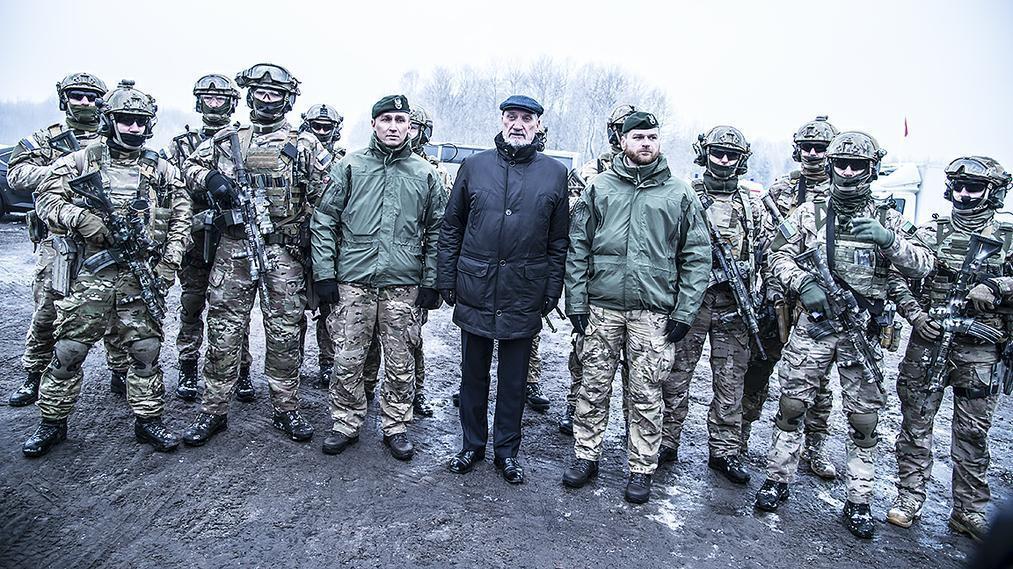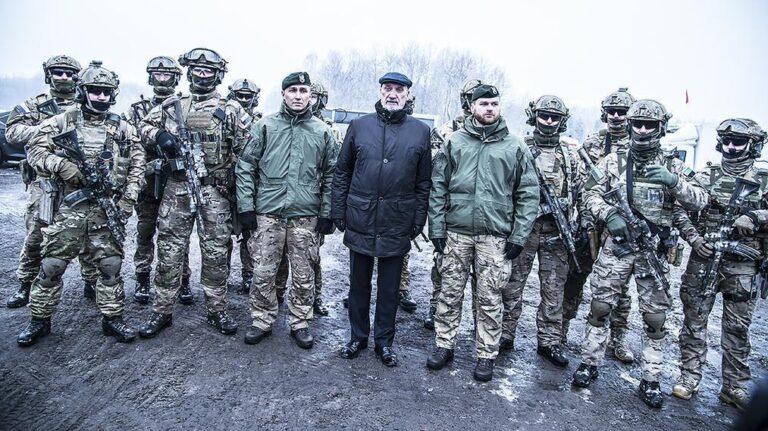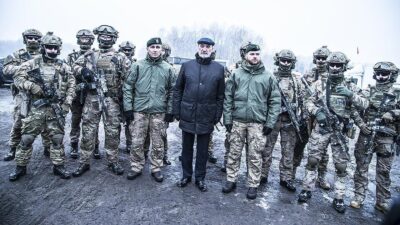Their numbers are growing rapidly, all served up in a patriotic sauce. What is this symbiotic relationship about? Making use of people’s enthusiasm to strengthen the country’s defences? Recruiting trained fanatics and voters?
On 3 December 2016, several elderly men set up an association called Strzelcy Rzeczypospolitej (Riflemen of the Republic) in the town of Pruszków outside Warsaw. The meeting is attended by Anita Czerwińska, an MP of the ruling party Law and Justice (PiS) and Maciej Jarosiński, the treasurer of the World Association of Home Army Soldiers (ŚZŻAK). The latter is an association of the veterans of underground fighting during World War II. The founders of the Riflemen association announce: “The tradition of the Home Army and the Cursed Soldiers is very important for us.” On a modest website, they claim they want to work to strengthen the defences of the country: “Our history, and the geographical location of our beloved motherland is a great challenge for us, which we want to face up to by educating young generations in the spirit of respect for patriotic traditions.”
World War II soldiers go to the Anaconda
Although Riflemen of the Republic is a young organisation with few members, it gets invited by the Ministry of Defence’s Office for Pro-Defence Organisations to take part in the programme Passport for Cooperation of Subunits of Pro-Defence Organisations with Military Units of the Armed Forces of the Republic of Poland. It is a kind of a long-term test for paramilitary organisations, a series of exercises and training. At the end of the project, members of the paramilitary organisations are to take part in real military manoeuvres, with the participation of regular NATO troops – Anaconda 2018.
In November, eighteen Riflemen of the Republic go to those biggest exercises of the Polish Army. According to official documents, they are joined by nine members of the Volyn Region of ŚZŻAK. How come? After all, a veteran association does not organise military training for its members, and the youngest of them are over 80 years old. “We don’t hold activities of this kind, we are a veteran organisation, most of us are old people” declares firmly Leszek Żukowski, an ex-soldier of the Home Army, today the President of ŚZŻAK. When asked about the participation of the members of the Association in the Anaconda, he says he knows nothing about it. “It would be very strange. It would have to be authorised by the National Board, and we certainly did not give such authorisation” emphasised the amazed President.
So who went to the manoeuvres under the name of the association of underground partisan veterans? Vsquare found out that a contract for the trip with the Polish Ministry of Defence was signed by Anna Lewak, the President of the Volyn Region of ŚZZAK. Lewak says her organisation did not need authorisation from the Board of the Association, as it has a separate legal personality. “The Lublin branch, headed by Andrzej Mazur, gathers young people who undergo training as part of the territorial defence system. They form a World War II re-enactment group and they went for the exercises with the army” President Anna Lewak explains the misunderstanding.
Who is Andrzej Mazur in this puzzle? In Lublin, a big city in Eastern Poland, he is an important activist, a leader of the circle of soldiers of the 27th Volyn Infantry Division of the Home Army. He has the reputation of an enterprising man, heavily supported by local activists of the Law and Justice party. He is considered an influential person – he was behind the dismissal of Grzegorz Kuprianowicz from the Committee for the Protection of Struggle and Martyrdom Sites, an important part of the Lublin branch of the Institute of National Remembrance. The reason for dismissal? Kuprianowicz spoke in Sahryń, a small village in Ukraine once inhabited by Ukrainians and Poles, where a crime had been committed in March 1944: the Ukrainian population was massacred Polish partisans. Kupranowicz publicly called that event “a crime against humanity committed (…) by members of the Polish nation, partisans of the Home Army who were the soldiers of the Polish underground State”. This statement was enough to lose the historian his job. It was not consistent with the official, often nationalistic message about irreproachable Poles who are surrounded by evil and immoral nations.
The story of World War II veterans’ alleged trip to NATO military manoeuvres proves one thing: it is easy to get lost in the tangle of paramilitary associations and foundations in Poland today. The chaos is so great that the Office for Pro-Defence Organisations of the Ministry of Defence recently removed the list of such organisations from its website. Why? Because it needs to be updated constantly – some organisations swallow up others, others break down into smaller ones.
“The business is moving, all the more because the government favours this type of organisations, especially with a rightist bias” says a government official involved in granting funds to such organisations. “These are no longer veterans’ associations bringing together elderly people, but organisations that refer to their traditions, led by young people. Let’s face it: these organisations are set up to have access to government grants of various kinds.” So, they will sign a contract with the Ministry of Defence as a pro-defence organisation, and claim funds from the Ministry of Culture as an organisation commemorating historical traditions. This is how, bit by bit, the pool of money for defence and patriotic activities is being divided in Poland today.
The lost decision of Minister Błaszczak
In November this year, the Anaconda 2018 exercises were attended by 327 people from 24 Polish pro-defence organisations. This was not their first contact with the manoeuvres. Two years ago, they also came to the Anaconda. Officers who talked to Vsquare say that in 2016 the army was forced to accept the presence of paramilitary organisation members by the then defence minister Antoni Macierewicz.
The Anaconda exercises are held every two years. This year, they are being attended by over 17,000 troops from various NATO countries (they are to end on 6 December). A considerable component of troops for these exercises will be provided by the Americans.
Polish soldiers admit that, like it or not, they are slowly embracing the presence of civilians at their exercises. This year, however, the presence of amateurs has sparked controversy. Not everyone in the army loves the fact that members of paramilitary organisations are involved in the biggest manoeuvres of the Polish army.
Members of pro-defence organisations account for only a small fraction of all those participating in the exercises. But a few things give rise to controversy. Firstly: what was the formal and legal basis for their participation in the exercises? The Polish Ministry of Defence still has not determined (out of laziness? intentionally?) a model for the functioning of NGOs in the national defence system. It is not known on what basis they can use military facilities or equipment.
Legal questions related to the participation of paramilitary organisations in Anaconda 2018 were to be partially regulated by the decision of the Minister of Defence Mariusz Błaszczak issued on 12 October. But a few weeks have passed, manoeuvres have begun and the decision still has not been published in the official journal. So, formally speaking, it does not exist. “What if something happens to one of the civilians during the exercises? Some kind of accident? Who will be held accountable?” asks general Waldemar Skrzypczak, former Commander of Ground Forces and former Deputy Minister of Defence. “I’m not sure if all legal aspects of this have been regulated. I’m afraid not.”
Many other military men share that opinion of the general. They too are unable to indicate a legal and formal basis for the participation of civilians in military exercises. “These are hundreds of organisations. They are more likely to compete than cooperate. For that reason, they are difficult to put into any reasonable framework and bring under real control. It is also not known how they should fit in the national defence system. A regular Territorial Defence Force for reservists was established in Poland a year ago, and it should provide support for the army and the civilian population in time of peace or war” points out a former serviceman.
General Bogusław Pacek, the person who created the Office for Pro-Defence Organisations at the Ministry of Defence (today outside the Ministry) reassures: if civilians don’t carry out any strictly military tasks, there is no reason for them not to take part in the exercises. “They can be used to guard strategic facilities when the military carries out their tasks on the training ground” says general Pacek. Lt. Col. Piotr Walatek, spokesman for the Operational Command of the Components of Armed Forces which organised the Anaconda, told Vsquare that the paramilitary organisations did only perform protection and support tasks for the army. In addition, they participated in exercises organised by voivodeship offices – Polish local governments.
A uniform for everyone
Rzeczpospolita, a serious newspaper, recently revealed that Americans had concerns about the participation of paramilitary organisations in the Anaconda 2018 manoeuvres. A representative of their military attaché told the head of the Office for Pro-Defence Organisations, Waldemar Zubek, that Americans did not want civilians at the exercises. Why? This is due to restrictions applicable to the exercises of US troops on training grounds in other countries. The attaché made it clear that civilians were not allowed in the direct area of exercises carried out by US troops. Nonetheless, pro-defence organisations attended the Anaconda. Their members were deployed so as not to have contact with American troops. Also, they were not given real weapons, only dummies.
“Americans realise that the involvement of civilians, not vetted or checked by anyone, poses an intelligence threat. We had information that some of the organisations involved in military training had gone to training camps in Belarus, Russia and Ukraine. Some of those people could have been recruited or used by the local services” says a former officer of the counterintelligence service. “It might also smacks of some kind of extremism to Americans, something they are particularly wary of in this part of Europe.” It is hardly surprising. From their perspective, it is better to play it safe because exercises such as the Anaconda can be a rich source of interesting intelligence about the current level of combat readiness or training systems of an army.
Col. Piotr Waltek, spokesman for the operational command which organised the manoeuvres, makes it clear: “Everyone qualified to participate in the exercises was reported for vetting by the Military Counterintelligence Service. In addition, the Office for Pro-Defence Organisations cooperates with the counterintelligence on an ongoing basis. We vet pro-defence organisations qualified for the Passport programme.”
Can such checks be trusted? A former counterintelligence officer we have asked about this only smiles: “Plenty of young people were hired by the military counterintelligence recently. Some of them come precisely from those rightist paramilitary organisations. I think this is one of the reasons why those checks have to be treated with a pinch of salt. Solid vetting of those groups takes long and painstaking work, and the present government wants to be on good terms with them. And they are.”
A senior army officer who talked to Vsquare claims that allowing civilians to enter training grounds and military facilities is a violation of army rules: “The military has its own procedures for checking soldiers’ health, psychological and criminal record. To become a soldier, you have to meet a number of requirements and undergo certain examinations and psychological testing. Meanwhile, members of the military organisations are not checked in any way.”
The officer adds that he knows cases of people who did not pass military psychological tests, and then went playing marines in military organisations. “The fact that the Office for Pro-Defence Organisations at the Ministry has organised some kind of exercises for them under the Passport programme, and the counterintelligence entered their names into a search engine does not mean those people have been reliably checked” says the military man. “If we are to replace soldiers with civilians, then why not policemen? Let’s have a Passport programme for young people who want to join the Police and let them patrol the streets and give speeding tickets.”
How Moczulski revived the Rifleman
What are pro-defence organisations in Poland? One definition says they are “associations and clubs whose programmes include patriotic and civic education and the so called ‘defence training’, ie. preparing members for a variety of tasks carried out by civil defence forces and territorial defence forces, as well as preparing young people for service in professional units of the Polish Armed Forces.”
After the fall of communism in 1989, the pro-defence movement in Poland started to revive in the form of riflemen’s associations, taking freely from the tradition of Strzelec (Rifleman), an organisation that brought together half a million members in Poland between World War I and II. The main idea of the Rifleman association was to train people, so that they could guard their freshly gained independence with a gun in their hand.
After 1989, Strzelec was revived by Leszek Moczulski, an opposition activist and later a politician of the right-wing party Confederation of Independent Poland. In press interviews, Moczulski did not hide that the Riflemen were to become a kind of paramilitary wing of his party.
The Riflemen did not last long in the shape given to them by Moczulski. After a few years, the movement broke up into smaller organisations that operated independently of the official administration. They had their own uniforms, badges and hierarchy. They were usually led by former military men or weapons enthusiasts working as volunteers and pursuing their own passions. The organisations lived off members’ fees, but the members were rather few. For many years, young people were not very keen on running around the woods with a gun in their hand in their spare time.
Everything changed after the Russian invasion on Ukraine in 2014. Poles became interested in security on an unprecedented scale. For the first time since 1989, public opinion polls showed concerns that a war might break out on Polish territory. A combination of the fear and the fact that universal conscription had been abandoned gave the result: a revival of pro-defence organisations. “Plenty of volunteers joined all of those organisations at that time. They all held some kind of parades in their small towns. Boys with nothing to do would say: Gosh, these guys have uniforms! It’s so cool, it makes them popular with girls! This is how it started, especially in small towns” says Paweł, a former activist of one of the organisations.
Polish defence ministry quickly noticed that movement. A Congress of Pro-Defence Organisations was held at the Warsaw Conference Centre of the Ministry of Defence in March 2015. Members of all paramilitary organisations operating in Poland met there for the first time. The Ministry’s goal was simple: scout that group and ensure that its members became candidates for professional military service in future.
Federation of Pro-Defence Organisations (FOP) was established at the Congress, but it was not joined by all the organisations. The following organisations became members of the FOP: Związek Strzelecki Strzelec Organizacja Społeczno-Wychowawcza, Związek Strzelecki Strzelec (based in Warsaw), Związek Strzelecki Strzelec im. Józefa Piłsudskiego, Związek Strzelecki Strzelec (based in Wągrowiec), Związek Strzelecki (based in Radom), Stowarzyszenie Instruktorów Legii Akademickiej in Lublin and Stowarzyszenie FIA (Fideles et Instructi Armis – Faithful, Ready and Armed).
“At that time, the Ministry of Defence realised the enormous fragmentation of those organisations. We couldn’t hold it all together. We asked them: Why do you want to set up an association and why did you come to the Congress? They answered bluntly: Because we want to get arms” a Ministry of Defence official recounts.
At the beginning of cooperation, the Ministry and the organisations were cautiously trying to get to know each other. The military did not trust them. The army treated members of the organisations a bit like lunatics who ran around the woods in World War II uniforms, and a bit like crooks who were looking for some profit for themselves.
The heads of the associations did not believe in the good intentions of the Ministry either. They feared that the only thing that would come out of them submitting to the Ministry would be the loss of their independence. But they restrained their ambitions for a long time, because paramilitary organisations needed Ministry support. Why? It was about access to equipment, army surplus uniforms and military shooting ranges. Another argument for making friends with the army was the fact that members of those organisations are a specific lobby supporting a bill on broader availability of guns. “A massive rush to own guns began about seven or eight years ago. First, there were gun lovers, and then they tried to find an ideology to put behind their hobby. They came up with this: We carry arms because we are patriots” says Paweł, a member of a paramilitary organisation. He thinks that what is happening in Poland today is not so much a militarisation of patriotism, as a patriotisation of militarism: “First came the rush for arms. The ideology appeared later.”
Trade fair under CBA scrutiny
In 2014, the Ministry objected. It did not intend to meet the demands of paramilitary organisations. The Ministry of Defence decided that organisations could not use Polish emblems: the coat-of-arms, flag, and symbols specifically associated with NATO. “It was a big mistake. The Ministry alienated everybody. Web forums erupted. The boys just didn’t get the toys, and they got angry. They felt like children allowed into the sandbox, but with no bucket or shovel” says Paweł.
In the autumn of 2015, Law and Justice wins the elections in Poland. Antoni Macierewicz becomes the defence minister. It is obvious that he intends to make use of paramilitary organisations and take them under the wing of the army. Admittedly, he dismisses general Pacek, accusing him that he started his military career as an officer of socialist Poland’s services, but he buys all Pacek’s ideas for paramilitary organisations without objections. And he puts them into effect.
Macierewicz’s people develop the Ministry’s Office for Pro-Defence Organisations. They increase its budget and find extra millions for the associations. Another idea of general Pacek completed by Minister Macierewicz is Pro Defense 2016 – a trade fair of pro-defence organisations held at exhibition centre Expo Mazury in Ostróda in the north of Poland. “People gathered around Macierewicz became enthusiastic about the idea of organising something like that on the eastern flank of Poland. It was decided that a Congress of Pro-Defence Organisations of NATO Member States would be held in Ostróda” says Paweł, who took part in preparations for the event. “But it was a hoax. The Ministry did not want European organisations to be involved in the event right from the start. Why? Because many of them are powers with their own strategies. Worth learning from: Finland – 1.5 million out of 6 million citizens are members of such organisations, Sweden, Norway, the Netherlands, Switzerland and Denmark also have great paramilitary models. But the Ministry of Defence was not eager to make use of them. Then it occurred to me that the Ministry must have had completely different plans for the pro-defence organisations. What they wanted to have there was blind fanatics and the electorate of Law and Justice in one.
At the end of the day, none of the European organisations came for the congress in Ostróda. “Organisation of the congress was the responsibility of the Office for Pro-Defence Organisations. The congress took place, but hardly anyone came. A few occasional guests appeared, someone had a speech but it was all closed for the press. The trade fair in Ostróda and the congress were boycotted even by some Polish pro-defence organisations.
Children fainting in the square
In 2016, the then defence minister Antoni Macierewicz is a special guest to the unsuccessful fair. He arrived in Ostróda in a military helicopter. He receives reports from young people from uniformed classes and members of the pro-defence organisations, standing to attention. “They brought in hundreds of kids from across Poland. But they didn’t prepare the right conditions. Ambulances had to take a few of them from the square straight to the hospital because the kids would simply faint on the miserable food rations” says Jarek, a former soldier who was involved in the organisation of the fair.
But the fainting youth is not spoiling anyone’s good mood. After receiving honours, the Minister visits the exhibition. Specially for him, the organisers stage out a commando landing on a beach on lake Sajmino.
In theory, everything was a success. Only a few months later it came to light that the organisation of the fair was being examined by agents of the Central Anti-Corruption Bureau (CBA). Investigators were checking if Polska Grupa Zbrojeniowa had contracted the construction of their trade fair stand without a tender, for a cost that considerably exceeded market price.
Members of the pro-defence organisations for which the event in Ostróda was organised were not particularly delighted. Many suspected that the entire fair was just about pulling them into the newly created national Territorial Defence Force. The Office at the Ministry of Defence announces that it wants to register all military associations. “A signal was sent that if we wanted ammo for the shooting range, equipment and so on, we could get them but we had to register” says Paweł, and he adds: “Some organisations bought it, but only some. In fact, the ministry was getting rid of some scrap and worn equipment, cleaning up its warehouses. As a result, it became very popular with some organisations.”
After the failure of the fair and the idea of the Association of Pro-Defence Organisations, word got out that the associations did not want to collaborate with the Ministry. They fear the ministry wants to use them for their own purposes. The rumour eventually reached the Ministry of Defence. And though the Minister of Defence changed soon – Macierewicz was replaced by Mariusz Błaszczak – the Ministry’s policy towards pro-defence organisations is still strong. But the Office for Pro-Defence Organisations has changed tactics. “We are getting better equipment now. In this way, the Ministry gave us a signal that we are important. This time, the professional soldiers were offended because they run around with poor equipment” says Paweł. In his opinion, participation in exercises and access to good equipment can please the organisations, but the real army is not going to like it: “From dislike and fear of the paramilitary organisations we have now entered the phase of fanatical love. And I’d like it to be simply normal.”
This article is a part of a research supported by the IJ4EU grant. The IJ4EU fund is not responsible for the content and any use made out of it.

Polish journalist, since 2016 working for onet.pl. Former journalist at Rzeczpospolita daily and editor-in-chief of Polska Zbrojna, war correspondent in Afghanistan. Based in Warsaw.






